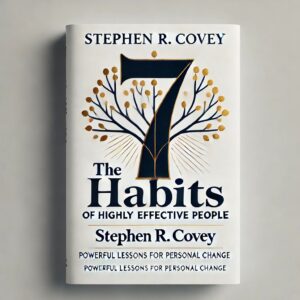The 7 Habits of Highly Effective People: A Guide to Personal and Professional Success

Stephen R. Covey’s “The 7 Habits of Highly Effective People” is widely regarded as one of the most influential self-help books of all time. Published in 1989, this groundbreaking work has sold millions of copies worldwide, offering timeless wisdom on how to achieve success and live a life of purpose and balance. Covey’s framework is built on the foundation of timeless principles and provides actionable steps for personal growth and effective relationships. L et’s delve into the essence of these seven habits and explore their practical implications.
The Paradigm Shift
Covey emphasizes that personal and professional effectiveness begins with a paradigm shift—a change in perspective and mindset. He distinguishes between personality ethics (surface-level traits like image and techniques) and character ethics (core principles like integrity and fairness). Success, he argues, is deeply rooted in aligning our actions with universal principles.
The 7 Habits: A Framework for Effectiveness
Covey’s seven habits are divided into three categories:
- Private Victory (Habits 1-3): Focus on self-mastery.
- Public Victory (Habits 4-6): Build effective relationships.
- Renewal (Habit 7): Sustain and grow your effectiveness.
Habit 1: Be Proactive
Key Principle: Take responsibility for your life and choices.
Being proactive means recognizing that you are the architect of your own life. Instead of reacting to external circumstances, proactive individuals focus on their Circle of Influence—the things they can control. They act based on values, not moods or conditions, and understand that their responses to challenges define their outcomes.
Practical Application:
- Replace reactive language (e.g., “I have to”) with proactive language (e.g., “I choose to”).
- Focus energy on solutions, not problems.
Habit 2: Begin with the End in Mind
Key Principle: Define your vision and purpose.
This habit encourages you to imagine your ideal future and work backward to create it. Covey introduces the concept of a personal mission statement, which serves as a guiding compass for decision-making. By aligning daily actions with long-term goals, you ensure that your efforts contribute to meaningful outcomes.
Practical Application:
- Write a personal mission statement.
- Visualize success in all areas of life: career, relationships, health, and spirituality.
Habit 3: Put First Things First
Key Principle: Prioritize what matters most.
Habit 3 focuses on time management and effective prioritization. Covey’s Time Management Matrix categorizes tasks into four quadrants:
- Urgent and Important (crises)
- Not Urgent but Important (strategic planning)
- Urgent but Not Important (distractions)
- Not Urgent and Not Important (time-wasters)
Highly effective people prioritize Quadrant 2 activities, which are aligned with long-term goals and values.
Practical Application:
- Schedule time for strategic tasks like planning and skill development.
- Learn to say “no” to distractions.
Habit 4: Think Win-Win
Key Principle: Seek mutual benefit in interactions.
This habit shifts the focus from competition to collaboration. A win-win mindset fosters trust, respect, and shared success. It’s not about compromising but finding solutions that satisfy all parties’ interests.
Practical Application:
- Practice empathic listening to understand others’ perspectives.
- Approach negotiations with a collaborative mindset.
Habit 5: Seek First to Understand, Then to Be Understood
Key Principle: Listen with empathy.
Communication is the foundation of effective relationships. Covey emphasizes the importance of empathic listening—truly understanding others before expressing your own views. This habit builds trust and opens the door to meaningful dialogue.
Practical Application:
- Avoid interrupting or formulating responses while others are speaking.
- Reflect back what you’ve heard to confirm understanding.
Habit 6: Synergize
Key Principle: Value differences and collaborate creatively.
Synergy is the idea that the whole is greater than the sum of its parts. By leveraging diverse strengths, perspectives, and talents, teams can achieve outcomes that are impossible individually. Covey argues that differences should be celebrated, not feared, as they spark innovation and creativity.
Practical Application:
- Encourage open dialogue and brainstorming in group settings.
- Seek out diverse viewpoints to solve problems.
Habit 7: Sharpen the Saw
Key Principle: Renew yourself regularly.
This habit emphasizes self-care and continuous improvement in four dimensions: physical, mental, emotional/social, and spiritual. Covey likens it to sharpening a saw—to remain effective, you must invest in renewal and growth.
Practical Application:
- Physical: Exercise, eat healthily, and rest.
- Mental: Read, learn, and challenge your mind.
- Emotional/Social: Build strong relationships.
- Spiritual: Reflect, meditate, and align with your values.
Integrating the Habits into Daily Life
Covey’s framework is not about quick fixes but long-term transformation. Here are some ways to integrate the habits:
- Start Small: Focus on one habit at a time to build momentum.
- Reflect and Review: Regularly assess your progress and make adjustments.
- Teach Others: Sharing the habits with others reinforces your own understanding.
Why These Habits Matter
The seven habits transcend time and culture because they are rooted in universal principles. Whether you’re a student, professional, or parent, these habits provide a roadmap for personal effectiveness and meaningful relationships. They teach you to:
- Take control of your life.
- Clarify your vision.
- Build trust and collaboration.
- Continuously grow and adapt.
Conclusion
“The 7 Habits of Highly Effective People” is more than a book—it’s a philosophy for living a life of purpose and balance. By adopting these habits, you can transform your mindset, enhance your relationships, and achieve your goals. As Covey aptly puts it, “Live your life by design, not by default.” The journey to effectiveness begins with small, intentional steps—and these seven habits offer the perfect starting point.








